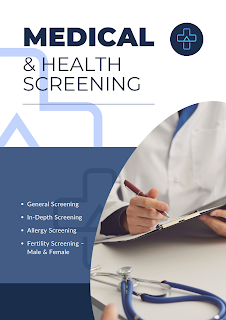In the context of health care, it is often said that prevention is better than cure. Preventive health care including regular screenings and immunizations helps to identify diseases in their latent stage and also helps to prevent diseases that can be controlled. This article highlights the significance of preventive health care, especially in terms of screens and vaccinations, in overall health maintenance.
The Importance of Screenings
Screening tests are important in that they can detect any health concern long before the person becomes aware of it and the relevant treatment has to be sought. These screening tests may differ from one individual to another based on age, gender, or risk factors but they generally include:
1. Cancer Screenings: Certain tests like nearly all breast cancers will be diagnosed via mammograms, while much other cervical cancer will be diagnosed by Pap smears and colonoscopies to detect the early onset of colon cancers when treatment is more likely to be successful.
2. Blood Pressure and Cholesterol Checks: These procedures when done alleviate the risks of developing diseases of the heart as well as cerebral stroke.
The Significance of Immunizations in Healthcare
In the development of infectious diseases, vaccines are part of the solution. Pathogen-specific immunity is induced by the vaccines in the body. Some facts about them are as follows:1. Vaccination of Children: Vaccinations as part of routine immunization are important to control and avoid occurrences of measles, mumps, rubella, diphtheria, pertussis, and other diseases to prevent severe complications and outbreaks of these infections.
2. Vaccination of Adults: Among others, the vaccines for influenza, pneumococcal infection, and those for tetanus are recommended for adults in order to minimize the chances of suffering serious illnesses and their complications, especially among older adults and individuals with chronic illnesses.
Undergo Travel Vaccination: Compulsory for individuals traveling to specific geographies where, for example, yellow fever and typhoid are endemic.
The Need for Preventive Health Care
1. Prioritizing Treatment: As part of preventive health care ‘screenings’, it is possible to discover some diseases at an incipient stage of radiological advancement, at which point more treatment options such as surgery might not be indicated.
2. Economical: The economy can also be benefited from vaccination and screening services because they prevent the need for treatment of patients with choruses well advanced.
3. Enhanced Health Status: One gets to enhance their health status as most diseases would either be prevented or treated before they advance to more serious conditions.
4. Protecting The Individual: Vaccination is not only beneficial to the person receiving the vaccine but also to others as it contributes to herd immunity, thus shielding people who are medically unfit to be vaccinated.
Challenges and Considerations
In spite of its advantages, preventive health care has challenges that include issues of access and affordability and resistant to voluntary vaccination. To resolve these challenges, it calls for:
Equity and Social Justice Education: Creating awareness among people on why they need to undergo screening and immunization processes
Healthcare Policies: Guaranteeing every individual access to preventive care services.
Research and Development: Bettering vaccines and screening tools for more efficacy and precision.
Conclusion
Screening and vaccination as measures for preventive health care is an essential aspect of public health for it brings forth quite a number of advantages in trying to prevent or control any diseases. Promoting the importance of regular check-ups, screening tests and immunization helps in a great deal to ensuring people take care of their health. Preventive care improves not only individual health but also the health of the community as well as the entire health care system.





0 Comments